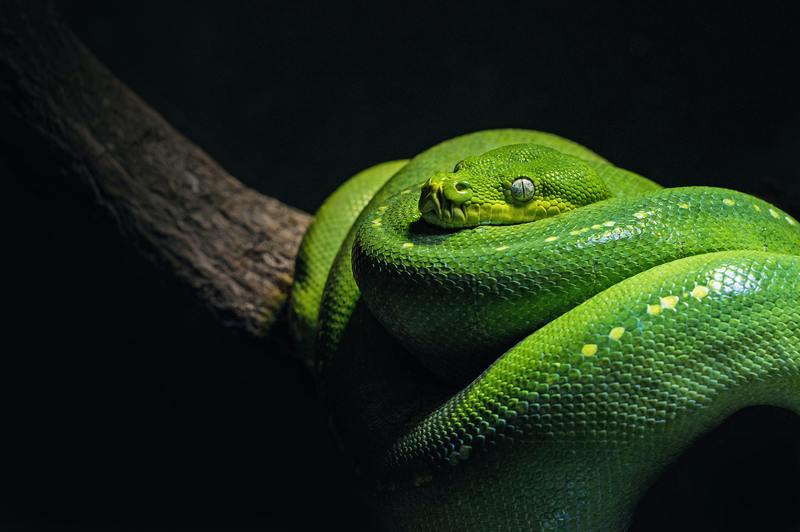Some gardeners allow snakes in their area, but some do not and instead pose the question: is there pest control for snakes? This guide will not answer a mere yes and no but instead fill you with all the pertinent information you need to know.

Venomous Vs. Non-Venomous
Snakes prefer to lurk in garages, crawl spaces, sheds, basements, and tall grassy places. Seeing one sets off an alert in most people, causing panic in the body and a desire to leave.
There is no such thing as a safe snake because all snakes can bite you; the only difference is whether they are venomous or not.
Because snakes have such a wide range of appearances, it can be tricky to distinguish between them. With that in mind, here are a few easy telltale signs to tell if you have a venomous or nonvenomous snake in your yard.
Venomous snakes have triangular heads, thin, and vertical pupils in yellow or green eyes. Non-venomous snakes, on the other hand, have rounded or spoon-shaped heads and rounded pupils.
Color varies widely for both kinds of snakes.
How To Keep Snakes At Bay Using Pest Control
A business can strive to eradicate any pests from your property first and foremost, but they can also determine what attracts snakes or other pests. It’s possible, for example, that you have mice or rats in your garage or barn.
Snakes will creep into the area in search of food. They can also be trying to keep their body temperature in check.
The following are the steps commonly followed by pest control companies:
Step #1. Snakes prefer to hide in locations like wood heaps, grassy areas, and any other “nesting” area, so pest control will examine your home and grounds for them. They’ll also look for food opportunities such as mice and insects in your home.
Step #2. Snakes discovered by pest control are not killed. They catch them using traps installed during the early review of your home.
Step #3. Snakes and other pests will be less attracted to your home if repellent is used around it. Because snakes enter your home in search of food, the repellant assists to repel insects, making the snakes less attracted.
Step #4. While pest control companies strive to make pest removal as painless as possible, there are times when it is inevitable. This could entail removing old tires from your property to freshen it up as well as wood heaps where snakes typically nest on.
If you need a guide on pest control companies, here is an article on what is the best pest control service so your time and resources are not wasted!
It might also give you an advantage to have a background knowledge on what is included in pest control.
How To Keep Snakes At Bay On Your Own
Snake repellents from the store are simple and safe to use.
They function by obstructing a snake’s sense of smell, preventing them from breeding in your yard. While store-bought snake repellents have a good track record, natural or homemade snake repellents have a mixed record.
You should be aware of a few natural snake repellents. While they may work in certain circumstances, there is no scientific evidence to back them up.
1. Naphthalene
Many commercial snake repellents contain naphthalene as a component. If you want to spare money, buy pure naphthalene and place it in areas where you’ve seen snake movement.
2. Sulfur
Powdered sulfur could be an efficient snake repellent. Because powdered sulfur hurts a snake’s skin, it deters them from visiting your property.
However, because the odor can be bothersome, use protective clothing.
3. Clove and cinnamon oil
Clove and cinnamon essential oils have potent odors that may discourage snakes. To have the best results, combine the ingredients in a spray bottle and apply them anywhere you’ve seen snake activity.
4. Garlic and onions
Sulfonic acid, which is found in garlic and onions, may be beneficial in repelling snakes. To repel snakes, combine chopped garlic and onions with rock salt and scatter the mixture over your home and yard.
5. Ammonia
Ammonia has a pungent smell that snakes may avoid. Fill plastic bags with ammonia-soaked rags and place them anywhere you see snake activity.
6. Vinegar
Snakes can be repelled by using regular white vinegar near bodies of water, such as swimming pools. Apply straight white vinegar along the margins of ponds and pools if you’ve spotted snake activity.
7. Lime
Snakes may be deterred by mixing lime with hot pepper or peppermint oil. In a glass bottle, combine the ingredients and spread the liquid around the border of your home or garden.
What Does Not Keep The Snakes Away
As snakes pose a threat to human safety, there are snake-proofing myths you should be aware of.
- Mothballs do not keep the snakes at bay. This is an old wives’ tale, as evidenced by studies dating back to 1985.
Snakes are unaffected by mothballs, and they will not approach your property if you use them. - Underestimating the skills of snakes in climbing is a big no-no. Snakes love to climb, and they can quickly ascend a tree or a barrier to obtain entry to your property.
- Pelletized lime will not keep snakes away, which is a frequent misconception. Lime, like mothballs, has little effect on snakes and will not deter them away from your home.
Conclusion
Is there pest control for snakes? The answer is definitely yes, and it comes in a variety of ways a homeowner or gardener like you could apply.
